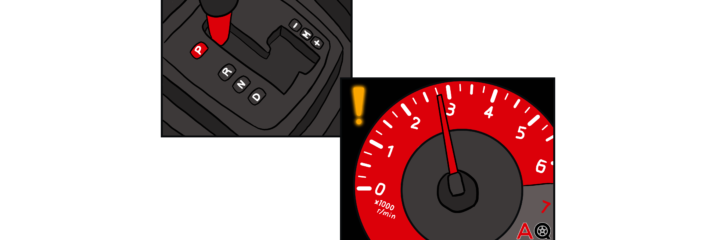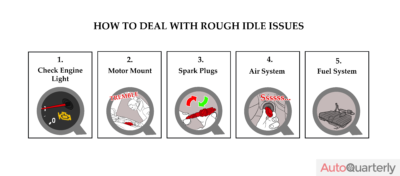If your car is behaving erratically, like revving up when it’s parked, vibrating, or shaking when the engine is in neutral, especially when your foot isn’t on the accelerator pedal, then the problem could be with any of the following systems – engine components and sensors, the motor mount, the spark plugs, the air system, or the fuel system.
You can resolve rough idle issues quickly without a visit to the car service center or a mechanic. Here’s a step-by-step guide to figuring out the reasons behind your car revving in park and fixing the issue.
How to Deal With Rough Idle Issues?
Check Engine Light
If the “Check Engine Light is on, it means the problem lies with the engine components or sensors. Most vehicles come equipped with advanced code readers – OBDII, that can pinpoint where in the engine the problem lies. You’ve already isolated the car part that needs to be looked at to resolve the issue. Most auto parts stores will offer code reading services for free if you don’t have one.
Other engine components and sensors that could lead to your car revving in park or neutral gear are a stuck throttle body, vacuum leak, malfunctioning Exhaust Gas Recirculation (EGR) valves, bad throttle body valve position sensor, disconnected or frayed wiring, or a faulty car computer.
If you don’t have a “Check Engine Light” warning system, you’ll have to diagnose the problem yourself, starting with the motor mount.
Motor Mount
Engine mounts are rubber components, three or four in number, that hold up the engine and isolate the engine vibrations from the car. When the motor mounts wear out, engine vibrations can be felt by the passengers.
Start the vehicle with the hood open and observe the engine when you rev it. If it jerks and vibrates, the problem is with the motor mounts, which need to be replaced.
Spark Plugs
If the spark plugs are contaminated or worn out, it could lead to rough idle issues. You’ll have to detach the spark plug from the engine to check for problems like oil leakage, burnt electrodes, corrosion, and other forms of wear and tear.
It’s also possible that they’ve simply run their course as most spark plugs have a limited life span and are supposed to be changed after a set number of miles. Thankfully, they’re cheap and can be replaced with ease.
Air System
Air system issues like leakage, wear and tear, blocks, and contamination can lead to your car running rough. The dirty mass air flow sensors(MAF sensors) have failed or aren’t doing their job properly if the air is entering anywhere in the system where it isn’t supposed to be. This also messes with the entire air and fuel mixing operation.
A failure in the Oxygen sensors (O2 Sensors) could also lead to a contaminated fuel-air mixture. A hissing sound when you start the engine is a good indicator that the problem is with the air system. Unless you’re an expert at visually identifying the problem with the air system, it’s best left to professionals.
Fuel System
If there’s a problem during the air and fuel mixing process, your vehicle will not be running properly. Ethanol could jam up the fuel system, bad gases could contaminate it, or the air to fuel ratio might be off, leading to rough idling. Problem with the fuel system will also result in decreased mileage. You can use a fuel system cleaner if you know how to, or let a trained professional have a look at the engine.
Rough idle issues, although not critical, should be addressed immediately to avoid bigger problems down the line.



